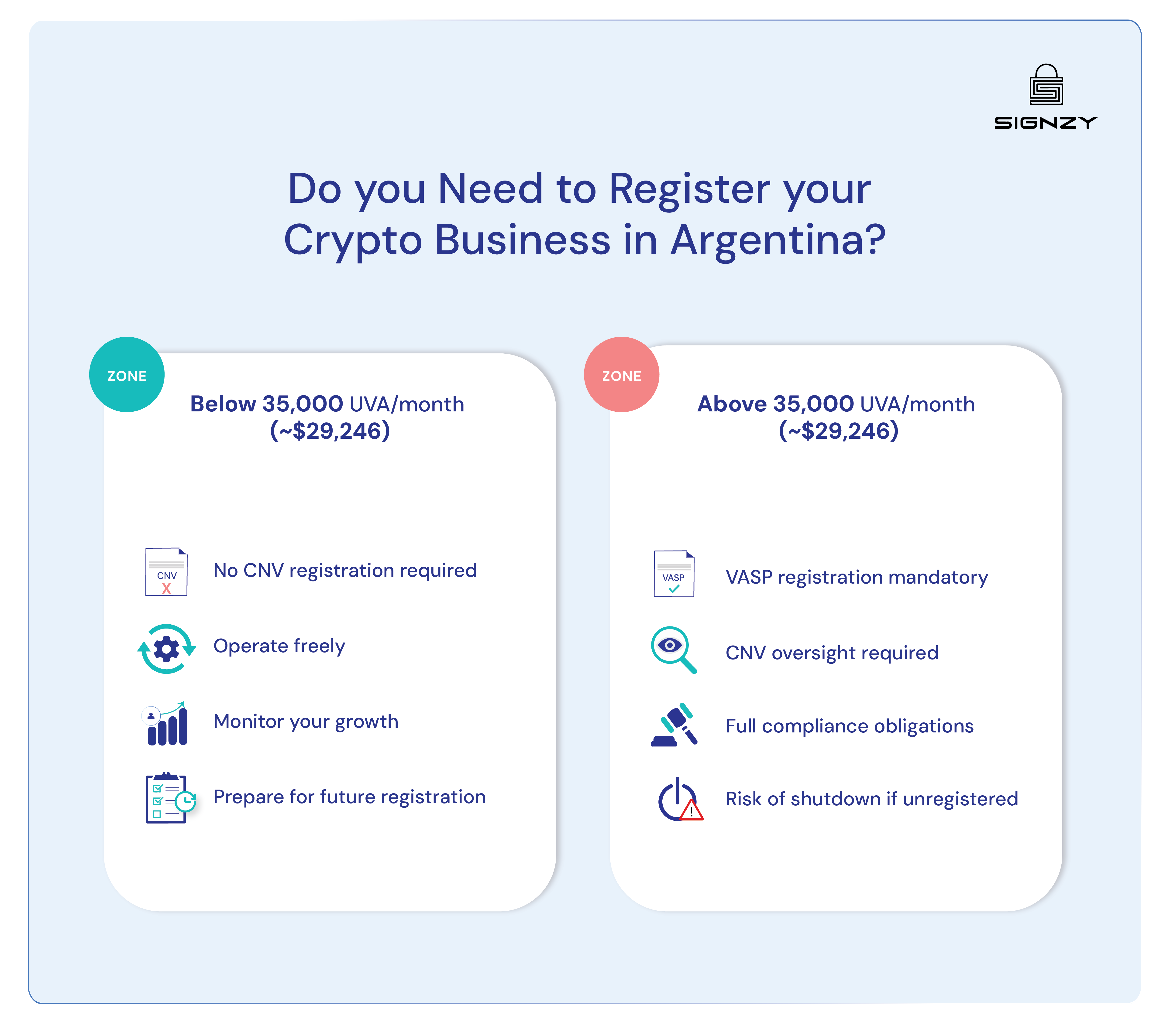Argentina Cryptocurrency Laws 2026: Overview and Core Laws
- Argentina requires all crypto businesses with monthly volumes exceeding 35,000 UVA (about $29,246) to register as VASPs with the CNV.
- Law 27,739 and CNV resolutions create a comprehensive regulatory framework covering registration, operations, cybersecurity, reporting, and anti-money laundering requirements for crypto companies.
- VASPs must implement strict KYC procedures, continuous transaction monitoring, and report suspicious activities to UIF within 150 days to comply with international standards.
Crypto laws in Argentina are actually a thing now. Who knew?
I was at this barbecue last weekend and everyone was arguing about whether you have to declare your Dogecoin or whatever. Half the people said yes, half said no, and my cousin who works at a bank just kept laughing.
Anyway, I went down a rabbit hole trying to figure it out and apparently there’s this whole new set of rules that came out this year. Some of it makes sense, some of it doesn’t, but whatever – at least now there’s an answer when people ask “is this legal?”
My friend’s been mining Ethereum in his garage since 2019 and he’s convinced the government is going to come after him. Probably not, but you never know.
Point is, if you’re doing anything with crypto in Argentina, you should probably know what the rules are. So, let’s look at the current state of crypto in Argentina.
Related Resources
State of Cryptocurrency in Argentina, Quick Glance
Argentina has quietly become Latin America’s crypto leader, with nearly 30% of Argentinians owning cryptocurrencies in 2024. What makes this really interesting is how people are actually using it. About 60% of Argentina’s crypto transaction volume involves stablecoins like USDT and USDC.
The demographic breakdown shows Millennials aged 18-35 driving adoption with ownership rates exceeding 21.9%, while Argentina ranks as the fourth-largest country by mobile crypto wallet users globally.
This massive adoption hasn’t happened in a regulatory vacuum, though. Five key government bodies have stepped up to create the framework that governs how crypto actually works in Argentina:
- Central Bank of Argentina (BCRA) – Issues the main regulatory communications like A-7030 that set operational rules for crypto exchanges, customer identification requirements, and monthly reporting obligations to track transaction flows.
- National Securities Commission (CNV) – Oversees Virtual Asset Service Provider licensing and ensures consumer protection measures are in place for platforms serving Argentine residents.
- Financial Intelligence Unit (UIF) – Receives mandatory reports from licensed crypto operators and monitors transactions for anti-money laundering compliance under FATF guidelines.
- Federal Administration of Public Revenues (AFIP) – Handles tax classification of crypto gains, determining whether transactions count as capital appreciation or business income based on trading frequency and volume thresholds.
- Ministry of Economy – Coordinates broader policy initiatives around digital assets and their integration into Argentina’s existing financial infrastructure.
Now that you have a broad overview of the arena, let’s read Argentina’s important crypto regulations.
Argentina’s Key Regulations For Cryptocurrency Platforms
Argentina has built its crypto regulatory framework through a series of specific laws and resolutions that came into effect between 2024 and 2025.

Law 27,739 – VASP Legislation (March 2024)
This law changed how Argentina handles crypto regulation. Passed in March 2024, Law 27,739 created the VASP framework and gave the CNV power to oversee crypto companies. The law says virtual assets are digital representations of value that can be traded or transferred digitally, but doesn’t include regular government currencies. Argentina basically copied what other countries were doing with FATF recommendations so they wouldn’t get in trouble internationally.
CNV Resolution 994/2024 – VASP Registration Framework
After Law 27,739 passed, the CNV put out Resolution 994/2024 in March to set up the registration process. If you want to do crypto business in Argentina, you have to register with the CNV.
This covers everything from crypto exchanges to companies that hold crypto for other people.
CNV Resolution 1058/2025 – VASP Regulations
This resolution from March 2025 gets into the details of how crypto companies actually need to run their business. If you want to stay registered and keep operating, there are specific things you have to do:
- Set up a proper company in Argentina (SA, SRL, or foreign branch) and prove you have between $35,000-$150,000 in capital, depending on what you do
- Keep customer money separate from company money, have decent cybersecurity, and file monthly reports on how many clients you have and what they’re trading.
- Get audited every year and pay about $10,000 annually in fees to the CNV
- Meet your deadline: individuals by July 1, 2025, Argentine companies by August 1, foreign companies by September 1
There are five different types of VASPs depending on what services you offer. Miss your deadline and you’re out of business.
UIF Resolution 49/2024 – AML/CFT Reporting Requirements
The Financial Intelligence Unit of Argentina made crypto companies follow the same anti-money laundering rules as banks. VASPs have to do full background checks on customers, watch for suspicious transactions, and report anything weird within 150 days. They also need to keep detailed records of everything and have systems in place to catch money laundering and terrorist financing. It’s basically the same paperwork burden that regular banks deal with.
BCRA Cryptocurrency Restrictions for Banks
While crypto companies can do whatever they want (if they register), regular banks can’t touch crypto at all. The Central Bank won’t let banks trade digital assets or offer crypto services to customers.
So you have this strange situation where a startup can run a crypto exchange, but Banco Santander can’t even help customers buy Bitcoin. Plus, crypto companies don’t get the same tax breaks that banks get, which makes it harder for them to work with the traditional financial system.
Tax Regulations and “Blanqueo” Amnesty Program
Argentina is running a huge tax amnesty program called “blanqueo” (basically means “whitening”) where people can come clean about money they never declared to the tax authorities, including crypto. The program works like this and gives crypto holders a chance to get right with the government:
- Pay between 5% and 15% depending on when you declare, but the first $100,000 is free if you keep it in an Argentine bank until December 2025
- You don’t have to bring foreign crypto back to Argentina – you can leave it wherever it is
- Available to Argentine tax residents and people who used to live there, but politicians from the last 10 years can’t participate.
- You have to declare everything under your real name, no hiding behind other people.
The program runs until September 30, 2025, with a final deadline of May 30, 2025. ARCA handles it now instead of AFIP, and if you join early, you get better deals on penalties.
Foreign Exchange Controls and Crypto Transactions
Argentina got rid of most of its “cepo cambiario” (currency controls) in 2025, which had made it nearly impossible to get dollars legally for over a decade. This change specifically helps crypto users because they can now freely exchange crypto without jumping through bureaucratic hoops.
The government also made other changes that help crypto adoption. You can now open dollar savings accounts as easily as peso accounts, use virtual wallets that work in dollars, pay for things with QR codes in dollars, and businesses can set up automatic dollar payments.
There are still some restrictions here and there, but it’s a massive improvement from the old system, where getting dollars was like pulling teeth.
How to Stay Compliant With Argentina’s Cryptocurrency Regulations With Signzy?
Staying compliant with Argentina’s crypto rules is pretty manageable once you get the right setup. The CNV has clear requirements for VASPs, and if you nail the basics, you’re good to go.
You need to handle customer verification, file monthly reports to the CNV, watch for suspicious transactions, and keep detailed records. Most crypto companies try to do this stuff manually at first, but it gets messy fast when you’re dealing with hundreds or thousands of customers.
That’s where compliance tech comes in handy:
✔️ Customer Verification: Signzy reads documents from over 200 countries and pulls out all the data automatically, so onboarding new users doesn’t take forever.
✔️ Risk Checks: The platform runs customers against all the usual lists – sanctions, PEPs, adverse media – and gives you a clear risk score.
✔️ Audit Records: Everything gets documented properly, so when regulators show up, you actually have what they’re looking for.
If you’re planning to register as a VASP in Argentina or are already dealing with compliance requirements, explore how Signzy handles Argentine regulations by booking a demo HERE.
FAQ
Is Bitcoin legal in Argentina?
Do I need to register my crypto business in Argentina?
What's the difference between CNV and UIF requirements?
Can banks in Argentina offer crypto services?

Gaurav Gupta
Gaurav Gupta is the Global Product Head at Signzy, leading the strategy and development of the company’s KYC, KYB, AML, and digital onboarding products used by banks, fintechs, and financial institutions across global markets. He specializes in building scalable compliance and verification platforms, transforming complex regulatory and risk workflows into seamless, automated product experiences. Gaurav works at the intersection of product, engineering, and AI.



![Cryptocurrency in India: KYC and AML Regulations [2026 Guide]](https://cdn.sanity.io/images/blrzl70g/production/18545a41d280d59abb7e03914da49843c1606b4e-2821x663.jpg)




